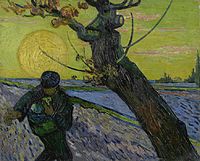This is the text of a sermon preaching at the Cathedral Eucharist on 16th July 2017. The texts were: Isaiah 55:10-13, Romans 8:1-11, Matthew 13:1-9, 18-23. I read and mull over the readings early on in my sermon prep - just sitting with the language and narrative - and before I'd even reached for a commentary, I found myself obsessed (for want of a better word) with the falling rain. Rain led me to smell. Smell to soil. Suddenly Isaiah 55 had opened up a new reading of the famous and familiar parable of the sower. We think we know what it means - them and us, those who whither away and those who remain faithful. Suddenly the challenge of soil management and the grace of rain subverted all that. So here are musings... musings on the smell of rain (time wise, paragraphs in italics I cut as I preached).
The smell of rain.
That, sweet earthy fragrance as rain falls; as rain falls on parched soil after a long period of warm dry weather. The scent of rain falling drop by drop; lightly, persistently, building towards a summer storm.
It evokes memories of hazy, lazy days: the intensity of unbearable heat broken by refreshing rains; the patter of water droplets on the picnic hamper, skyward glances, is that rain? Plants thirsting for every drop; sandals splashing through puddles; lawns recovering their verdant hew.
The smell of rain. It has a name.
Petrichor.
‘Petrichor’ is derived from ‘petra' meaning stone and ‘ichor’, the life blood of the gods in Greek mythology. Water on soil is rich in life. That evocative aroma is the combination of plant oils and chemical compounds released from the soil when it rains.
Recent research using high speed cameras show hows petichor, the fruitful fragrance of rain, gets into the air. As raindrops hit the soil, they capture tiny bubbles of air; these ‘bubbles’ shoot upwards, erupting into a fizz, releasing fine droplets; they remain suspended in the air as ‘aerosols of scent’.
The smell of rain: a scent which fills the air evoking perhaps a primal sense of dependence. Raindrops which stave off fear of drought; summer showers signalling the potential for growth, fruitfulness and harvest. The smell of rain signals survival; ‘the smell of rain is rich with life’.
In India, the monsoon rains have an impact on psychological, agricultural, political and economic life. In the UK, Isaiah’s imagery of rain watering the earth giving seed and bread still resonates for farmers, gardeners, retailers and shoppers effected by yield and price.
What is true of rain, is true of God’s word and purposes. Isaiah’s vision of life, hope, joy and peace is expressed in the extraordinary vibrancy of the natural world: song breaks forth and we are invited to imagine the rapturous applause of creation.
The smell of rain brings life.
The sound of creation’s praise signals a new thing.
If the smell of the rain is a sign of God’s kingdom, might the distinctive nature of discipleship carry its own fragrance? Might the trees of Isaiah’s vision give us a clue?
Residents of Cathedral Close know that brambles grow with particular vigour; and whilst we delight in plucking the fruit and making blackberry jam, thorn and brier colonise a garden. Here in Isaiah, those plants give way to the fragrance of the myrtle and the strength of the cypress.
Like trees, lives transformed by fulfilling God’s purposes, will have have distinctive form and shape. Unlike thorns, we aren’t to colonise or chock. Yet we are rooted and visible within our public space.
There will be vitality in our deeds which have the ‘fragrance’ of healing the broken, concern for the vulnerable and an infectious joy; there will be strength in standing up against abuse or neglect, and standing for justice, mercy and peace.
Isaiah associates God’s word with rain, watering the earth; Jesus’ parable orients us towards the soil itself - inviting us not to solve a riddle, but simply to listen. To let words surprise, challenge, inspire and shape our posture - the body language of the church if you like; what we reveal of God’s love.
Soil is a complex mix of minerals, organic matter, base material and water - with varying qualities acidity, drainage, fertility. Soil is in some way ‘managed’.
The Environment Agency and Gardeners’ Question Time offer advice on soil types and appropriate plants.
On Surrey clay and chalky Downs, the smell of rain means it is rich with life: but we also have some input in cultivating good soil.
Perhaps Jesus is pointing us to the need to cultivate receptive soil - preparing different types for sowing, rainfall and harvest. Listen!
Perhaps Jesus is pointing us to the need to cultivate receptive soil - preparing different types for sowing, rainfall and harvest. Listen!
That soil isn’t just out there in the world; soil is our inner life too. Stanley Hauerwas is a theologian alert to the challenge of discipleship. We are to proclaim the Gospel afresh in a world which is asking questions about identity, authority, hope and fear. Society may be shaped by Gospel values in our judicial or health care system - but is it ready to hear anew? Are we? What’s the soil like? Has it rained lately?
In his commentary on Matthew, he writes of being ‘possessed by possessions’ and our desire to act in the world and serve the poor without losing them. He speaks of the lure of wealth and cares to the world which ‘darken and choke our imaginations’ which reduces the Gospel to a sentimental ‘formula for “giving our lives meaning” without judgement’. He also challenges the strategies we adopt as a church to ‘recover lost status and/or membership’ without facing the demands of being a disciple.
Canon Andrew, Neil Vigers and I have been discussing his engagement with Dietrich Bonhoeffer, who challenged the shallowness of what he called ‘cheap grace’. He argued for the increased visibility of the church - a church were the soil is being prepared for deep roots to be established and where we embody the fragrance of the joy and peace proclaimed by Isaiah.
Hauerwise writes: ‘What Bonhoeffer gives those in the ministry to do is imagine how the social significance of the everyday ministerial tasks such as preaching, presiding at the Eucharist, and caring for the dying are practices for the formation of a people who are capable of being a political alternative to the world.’
To speak of being an alternative is about cultivating an imaginative, social and ethical common life - which is a sign of God’s Kingdom. Our body language is shaped by practices which speak both of the truth of our human condition in all its frailty; and of the truth of God’s love which binds up the broken. In a complex world, we are to name signs of God’s Kingdom in mutual care and ecological concern and to challenge the toxicity of selfish desires to possess and consume.
Last week, we heard Paul grappling with these recognisable existential realities of tension, choice and struggling to do the good that he wills - for the soil of his life to be fruitful. Today, we hear him express the ultimate reality of his hope in Christ: there is no condemnation. Through his death and resurrection, sin and death are defeated; the power and richness of resurrection life breaks in. Despite human weakness and distress, grace, joy, blessing bubbles us within us. The Spirit brings life and peace to our mortal bodies.
We share with Paul, Bonhoeffer and Hauerwas practices which call for humility and repentance, joy and self-giving. In word, sacrament and care we do taste, touch, see, hear and even ‘smell’ the rain of God’s Kingdom. Our practices embody and express with an intimacy and patience the blessing of God - enabling us to be a blessing to the world, that the world might clap and sing in praise.
These practices they are rooted in the love of God which is spoken in the word of creation and the Word made flesh dwelling with us; it is a word we still hear in the cries, murmurs and songs of the Holy Spirit.
These practices they are rooted in the love of God which is spoken in the word of creation and the Word made flesh dwelling with us; it is a word we still hear in the cries, murmurs and songs of the Holy Spirit.
In this Eucharist, the sower’s seed becomes bread for the eater; Christ the grain that dies, multiplies and feeds with heavenly food. Here we become alert to the signs of God’s Kingdom in our world - to the smell of the rain as God’s word touches the soil of our lives. We also need to cultivate the soil of our hearts; in prayer, God’s refreshing word rains down on us.
Whether we take a psalm, a favourite hymn, the Lord’s Prayer, or a line from Scripture; whether we use an app to pray the daily office or re-appropriate the monastic hours in our daily life, or pause as the kettle boils, as we walk from the station or sit beside another in compassionate, companionable silence.
The rhythm of life is made holy; the soil is prepared; the seed is sown.
We smell the rain; it is rich with life.
May our lives carry the fragrance of life-giving, self-giving love.
© Julie Gittoes 2017


